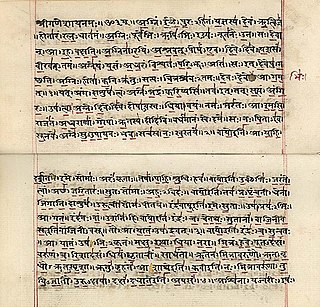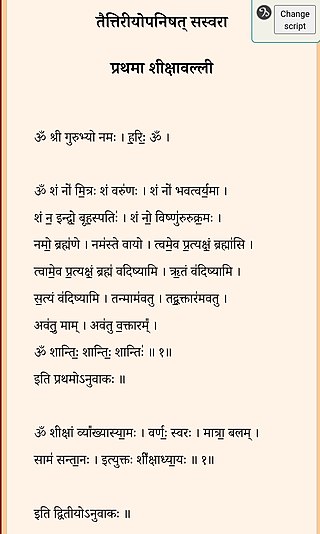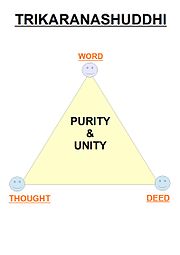
Ahimsa is the ancient Indian principle of nonviolence which applies to actions towards all living beings. It is a key virtue in Indian religions like Jainism, Buddhism, Hinduism, and Sikhism.
Mahātmā is an honorific used in India.

Vande Mataram is a poem written in Sanskrit and Sanskritised Bengali by Bankim Chandra Chatterjee in the 1870s. The first two verses of the poem were adopted as the National Song of India in October 1937 by the Congress.

Humility is the quality of being humble. Dictionary definitions accentuate humility as low self-regard and sense of unworthiness. In a religious context, humility can mean a recognition of self in relation to a deity, and subsequent submission to that deity as a member of that religion. Outside of a religious context, humility is defined as being "unselved"—liberated from consciousness of self—a form of temperance that is neither having pride nor indulging in self-deprecation.
Kriyā most commonly refers to a "completed action", technique or practice within a yoga discipline meant to achieve a specific result.
The yamas, and their complement, the niyamas, represent a series of "right living" or ethical rules within Yoga philosophy. The word yama means "reining in" or "control". They are restraints for proper conduct given in the Vedas and the Yoga Sutras as moral imperatives, commandments, rules or goals. The yamas are a "don't"s list of self-restraints, typically representing commitments that affect one's relations with others and self. The complementary niyamas represent the "do"s. Together yamas and niyamas are personal obligations to live well.

Satya is a Sanskrit word loosely translated as truth or essence. It also refers to a virtue in Indian religions, referring to being truthful in one's thoughts, speech and action. In Yoga, satya is one of five yamas, the virtuous restraint from falsehood and distortion of reality in one's expressions and actions.

The three wise monkeys are a Japanese pictorial maxim, embodying the proverbial principle "see no evil, hear no evil, speak no evil". The three monkeys are
Vyākaraṇa refers to one of the six ancient Vedangas, ancillary science connected with the Vedas, which are scriptures in Hinduism. Vyākaraṇa is the study of grammar and linguistic analysis in Sanskrit language.
Achourya or Asteya is the Sanskrit term for "non-stealing". It is a virtue in Jainism. The practice of asteya demands that one must not steal, nor have the intent to steal, another's property through action, speech, and thoughts.

Svādhyāya is a Sanskrit term which means self-study and especially the recitation of the Vedas and other sacred texts. It is also a broader concept with several meanings. In various schools of Hinduism, Svadhyaya is a Niyama connoting introspection and "study of self".
Shaucha literally means purity, cleanliness, and clearness. It refers to purity of mind, speech and body. Shaucha is one of the niyamas of Yoga. It is discussed in many ancient Indian texts such as the Mahabharata and Patanjali's Yoga Sutras. It is a virtue in Hinduism and Jainism. In Hinduism purity is a part of worship and an important quality for salvation. Purity is a mind pure and free of evil thoughts and behaviors.
Malayalam is one of the Dravidian languages and has an agglutinative grammar. The word order is generally subject–object–verb, although other orders are often employed for reasons such as emphasis. Nouns are inflected for case and number, whilst verbs are conjugated for tense, mood, and causativity. Malayalam adjectives, adverbs, postpositions, and conjunctions do not undergo any inflection; they are invariant.

The Taittirīya Upanishad is a Vedic era Sanskrit text, embedded as three chapters (adhyāya) of the Yajurveda. It is a mukhya Upanishad, and likely composed about 6th century BC.

Fuck: Word Taboo and Protecting Our First Amendment Liberties is a nonfiction book by law professor Christopher M. Fairman about freedom of speech, the First Amendment to the United States Constitution, censorship, and use of the word fuck in society. The book was first published in 2009 by Sphinx as a follow-up on the author's article "Fuck", published in 2007 in the Cardozo Law Review. It cites studies from academics in social science, psychoanalysis, and linguistics. Fairman establishes that most current usages of the word have connotations distinct from its meaning of sexual intercourse. The book discusses the efforts of conservatives in the United States to censor the word from common parlance. The author says that legal precedent regarding its use is unclear because of contradictory court decisions. Fairman argues that once citizens allow the government to restrict the use of specific words, this will infringe upon freedom of thought.
Dhī is a Sanskrit word meaning 'understanding', 'reflection', 'religious thought', 'mind', 'design', 'intelligence', 'opinion', 'meditation', 'imagination', 'notion', and 'intellect'. This word is directly connected with the word Vāc, meaning Speech, derived from Vac meaning, 'to speak'. Dhi is the voiced Vāc or 'Speech', it is the thought-mind or intellect. Dhi also means 'to hold' or 'to place', and indicates the activity of the intellect.
Idam is a Sanskrit/Tamil/Pali word which denotes location, position, place. In grammar it is used at the beginning or middle of a sentence as a nominative or attributive pronoun, combined with or without ya, adds emphasis to other nouns, propositions etc.; and means – this, here or yonder, present or seen nearby, fit for, or without reference to noun refers to एतद् ('that') or to what precedes.
Akrodha literally means "free from anger". It's an important virtue in Indian philosophy and Hindu ethics.
Punya (Sanskrit: पुण्य, romanized: puṇya, lit. 'virtue'), also rendered punyam is a concept in Hinduism with various definitions. It generally refers to virtue or merit, and the activities that allow one to acquire this attribute, in order to achieve liberation from samsara, the cycle of birth and death in the material world.
Indian Ethos in Management refers to the values and practices that the culture of India can contribute to service, leadership and management. These values and practices are rooted in Sanathana Dharma, and have been influenced by various strands of Indian philosophy.







